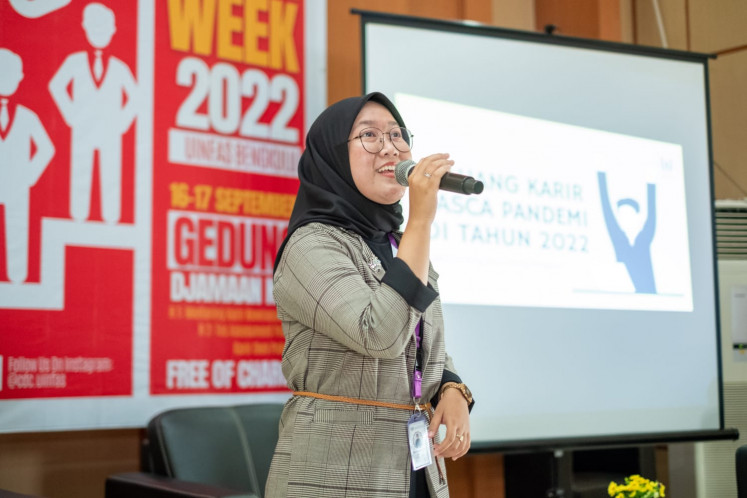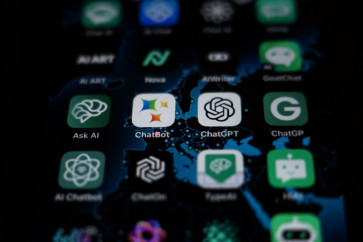Popular Reads
Top Results
Can't find what you're looking for?
View all search resultsPopular Reads
Top Results
Can't find what you're looking for?
View all search resultsHow to navigate the ups and downs of remote working
Change text size
Gift Premium Articles
to Anyone
D
espite its benefits, remote working puts workers at risk of social detachment, which can be detrimental to a varying degree. Fortunately, there are ways to deal with it, such as self-management.
The rising popularity of remote working opens up new opportunities. Remote working allows workers to take on jobs not available in their areas which also often comes with better pay.
However, remote working has its drawbacks. A 2021 joint survey by the youth mental health community Into the Light and social change platform Change.org revealed that 98 percent of people living in Java during the pandemic’s stay-at-home policy experienced loneliness, which afflicts people across genders and ages.
"The lack of interactions with colleagues is quite a drawback," said Bella Devy Permana, a 26-year-old private company employee who has spent more than half a year working remotely. In spite of this, she added that remote working had generally been a "good experience" for her.
A void to fill: Bella Devy Permana, who has been working remotely for more than half a year, admits that she misses the interactions between her and her colleagues. (Courtesy of Bella Devy Permana) (Courtesy of Bella Devy Permana/.)Such is also the case for Eko Romadona, a 24-year-old full-stack designer who mostly works from home and only goes to the office once a month. He enjoys the remote working system but admitted that it was not without inconveniences.
"When it comes to remote working, [among the challenges are] the difficulty to find inspiration, not being able to bond with my coworkers, higher internet spending and overtime [that goes beyond traditional hours] at times," said Eko.
“Working remotely can give you more time to do things that you love for yourself, such as cooking and cleaning the house in the morning, exercising more without worrying about the time required to travel to the office,” said Angeline Beauty Stacia, a 24-year-old headhunter in Jakarta, who prefers to be called Stacy.
“[However, there are several drawbacks] such as boredom and lack of [social interaction]. And to some, it would mean that they will move less, resulting in deteriorating health,” said Stacy.
Personality traits and loneliness
Social detachment is often linked with personality traits, especially social life, which is the introversion-extraversion spectrum. Depending on where someone is on the spectrum, they would display different attitudes and behaviors in particular social situations.
“Extroverts have an objective orientation, so they focus more on the outside world or the perception of the surrounding environment. Usually, extroverts like to interact and socialize with others," explained Putri Rahmalia, a 25-year-old practicing psychologist at Logia Consulting, on the difference between the two sides of the spectrum.
Putri added that extroverts were likely to find remote working less enjoyable because it limited social interaction. Extroverts are also more prone to stress when they do not get enough social interaction. It is therefore understandable that remote working can drain them.
"[On the other hand], if someone has an introverted personality, they tend to focus on subjective experiences, being centered on their own self," she said. "Usually, introverts prefer to become observers and are more comfortable alone.”
Putri explained that remote working provided introverts with a reprieve from having to leave their comfort zone. Working at the office can be draining for introverts who require more mental energy when being put in a social setting like the workplace.
She added that introverts tended to be analytical at work. Being able to work alone gives "introverted workers more freedom to be focused on their tasks." However, she also warned that it could also hinder their soft skill development, particularly their social skills.
Nevertheless, compared to extroverts, introverts tend to have a more positive outlook on remote working and its accompanying features. Bella, who considers herself an introvert, agrees.
"I prefer working remotely," Bella said. "As an introvert, having minimum interactions with many people is truly an advantage." That being said, Bella admitted that remote working could make someone feel lonely, even her.
Productivity challenges
Working remotely can also challenge workers' productivity. Aji Guntara, a 26-year-old junior audit consultant in South Tangerang, Banten, said he must deal with tech issues, specifically poor internet connection, which often lead to miscommunications at his workplace.
Aji also said managing human resources was more difficult when team members worked away from each other. He talked about a case in his company when a certain colleague was unable to manage their own tasks and disrupted the team's flow due to the lack of supervision.
Downside: Aji Guntara learns from experience that the lack of supervision from remote working can cause team members not performing well. (Courtesy of Aji Guntara) (Courtesy of Aji Guntara/.)Meanwhile, Bella sometimes experiences problems when working on new tasks. Specific tasks may require her to receive face-to-face training, which can be challenging since she works in Tangerang, while her office is located in South Jakarta. Bella’s preference to work at the office, however, might not match the needs of the industry she is in.
Stacy faced the opposite. “Nowadays, many companies require [their employees to be onsite],” she said. “[This makes my job] quite challenging as many people still prefer to work remotely.”
Despite the risks of social detachment and other technical difficulties linked to remote working, Putri thinks most people can get through it well. But for those who are still struggling with remote working, Putri has several suggestions, starting with arranging a comfortable working space and creating a daily to-do list.
Putri also believes that remote workers need to give themselves simple incentives after a workday, which could be something as simple as watching an episode of their favorite show.
"Regardless of personality, one can work remotely comfortably and successfully as long as they have a growth mindset and the ability to manage themselves," she said.
It is thus important to create some sort of balance. Whether it is remote or onsite work with a big load, people ought to find ways to get social stimulation one way or the other, though Putri acknowledged that introverts would have a tougher time.
"Since humans are social creatures, they can't live alone completely," Putri said. "Introverts should spare time to communicate or meet up with close friends so they won't lose interest in socializing."
Technology can help to reach out to friends and improve social interaction. In that respect, Bella explained that she resorted to social media to interact with her friends. She added that she sometimes worked in a coworking space to avoid "feeling bored."
Eko, who said he was more of an ambivert, someone around the middle of the introversion-extraversion spectrum, said he had his ways of making sure that he socialized with others.
"I'm comfortable [with remote working]. I even like it," Eko said. "But [since I realize that] humans are social beings, I talk to others at least once a week, so I don't lose that social [aspect] and [to avoid getting bored], I'd go out once in a while to get chicken noodles or something."













